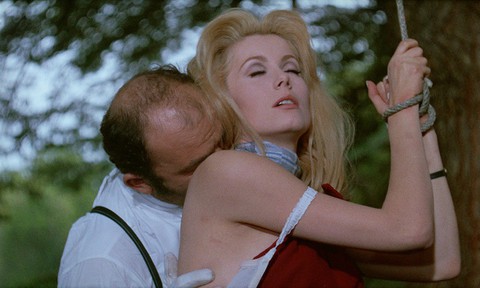

Belle de Jour (1967) is a psychological drama directed by Luis Buñuel, based on the novel by Joseph Kessel. Starring Catherine Deneuve in one of her most iconic roles, the film follows Séverine Serizy, a beautiful but emotionally distant housewife who, despite loving her husband, is unable to connect with him physically. Seeking to explore her hidden desires, she secretly begins working at a high-class brothel during the afternoons while maintaining her respectable social life. The film blends fantasy and reality, creating an ambiguous and dreamlike narrative that challenges traditional notions of morality and desire.
A defining element of Belle de Jour is Buñuel’s surrealist approach to storytelling, which leaves much of the film open to interpretation. Séverine’s experiences at the brothel, her fantasies, and her real life blur together, making it difficult to distinguish between what is real and what exists only in her imagination. Buñuel, known for his dreamlike filmmaking style, incorporates subtle yet unsettling details—such as unexplained bells ringing and bizarre fantasies—that add to the film’s enigmatic quality.
Catherine Deneuve’s cold yet mesmerizing performance perfectly captures Séverine’s inner conflict. Her character is torn between propriety and desire, repression and liberation. Deneuve’s restrained yet expressive portrayal allows the audience to project their own interpretations onto her character, making her journey all the more compelling. The film’s striking cinematography and elegant costumes further enhance its sophisticated yet provocative tone, making it a landmark in European cinema.
Upon its release, Belle de Jour was both controversial and highly acclaimed, winning the Golden Lion at the Venice Film Festival. Over time, it has been recognized as a masterpiece of erotic and psychological cinema, influencing countless filmmakers. Its bold exploration of female sexuality and the interplay between fantasy and reality continues to spark discussions, solidifying its place as one of Buñuel’s greatest works.



